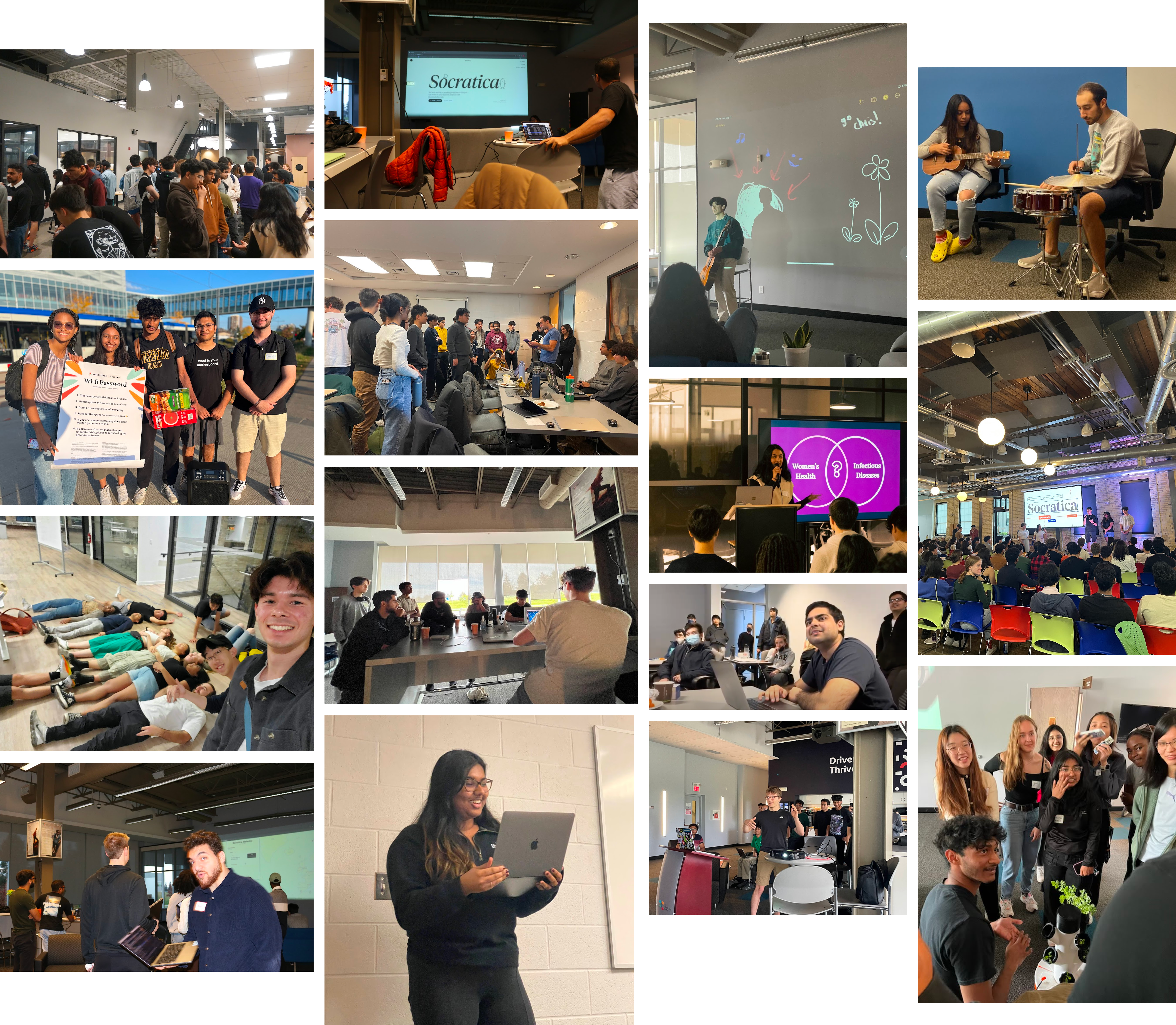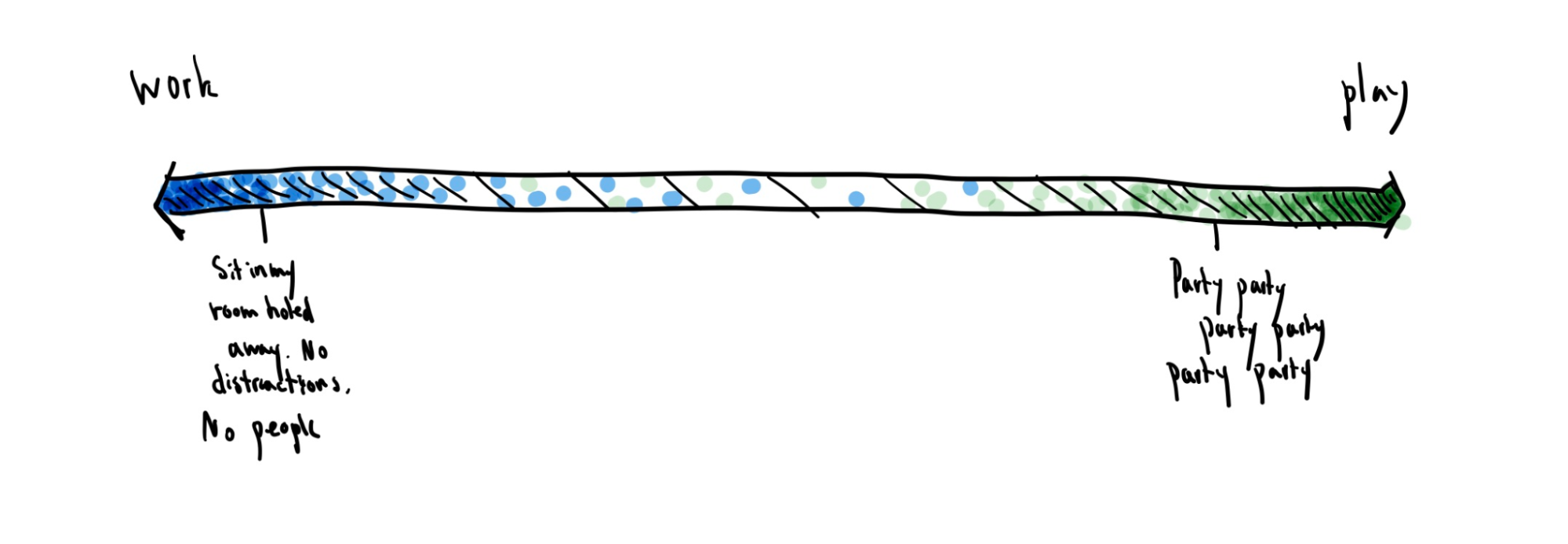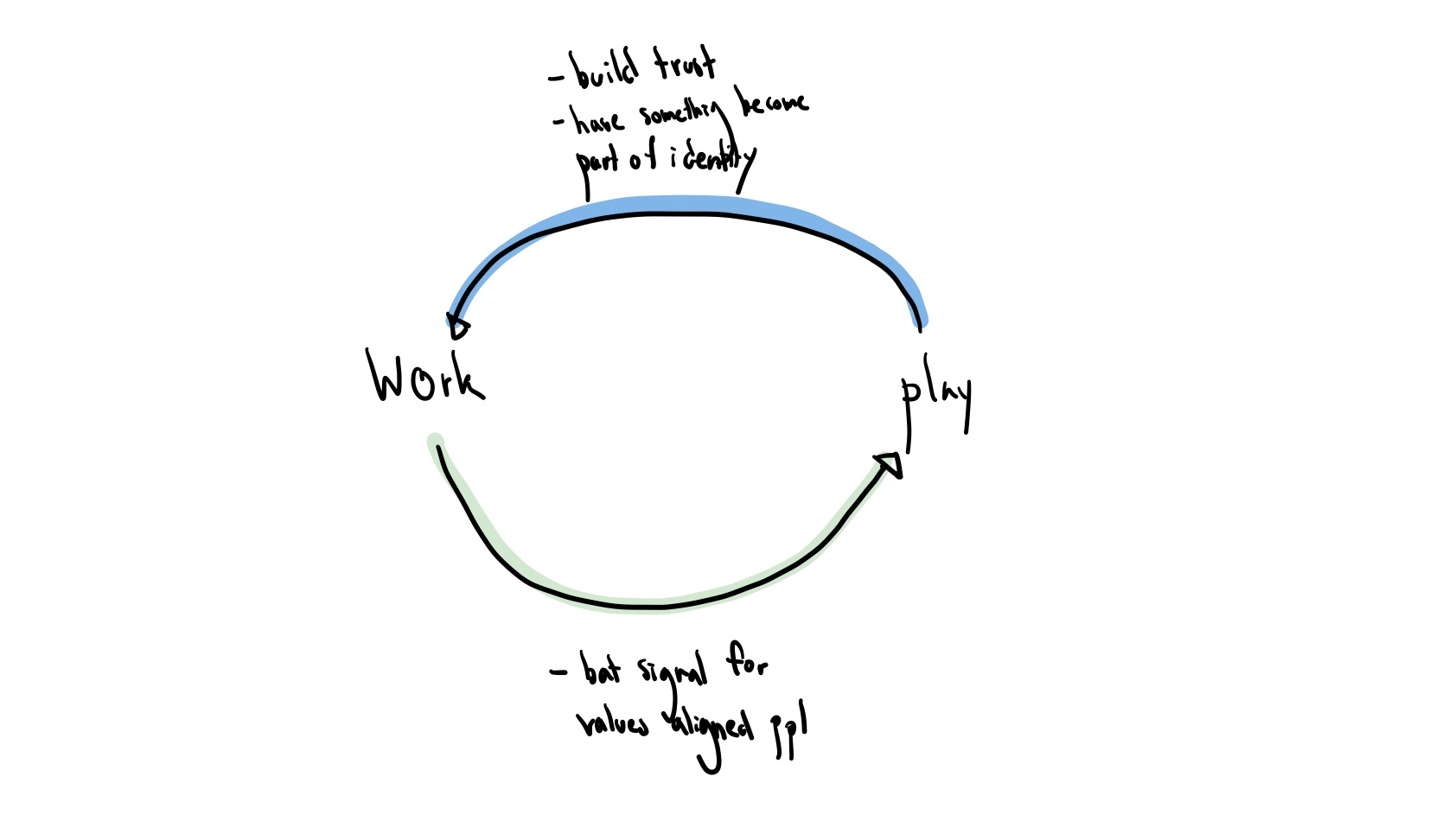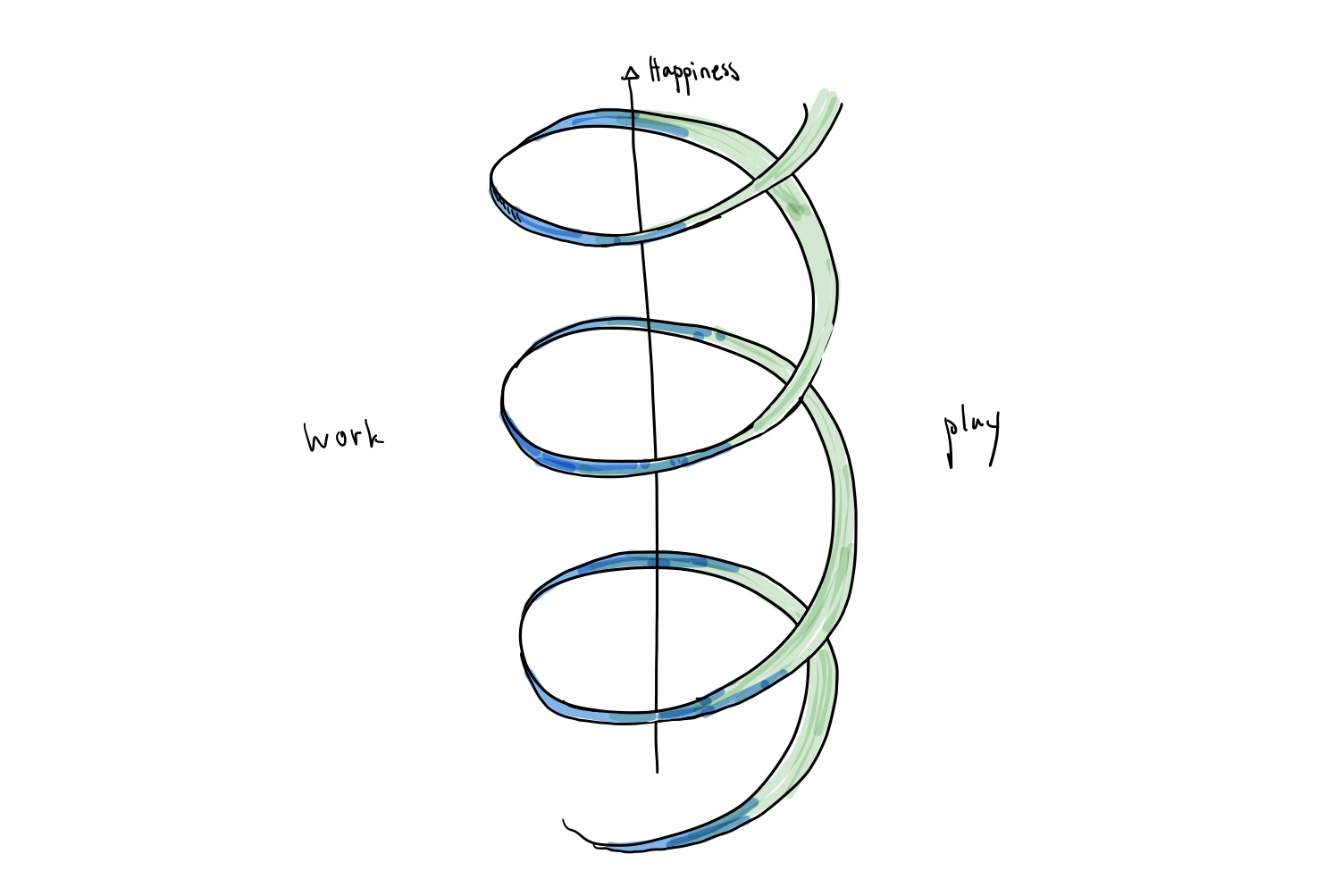What is Socratica?
Written by Anson Yu and Joss Murphy
TLDR: We assemble kind, nerdy, and ambitious people that are dedicated to consistently creating.
We’re united by a couple of core beliefs:
- There are increasingly few, low stakes ways for people to make interest, values aligned friends IRL
- These spaces need to be recurring, consistent, and accessible.
- Great creative work is done together, across backgrounds and disciplines
- Small, high trust groups are the foundation of boundary pushing work - in engineering, science, art, and more
Our job is that not of organizers, but little scheming elves trying to support the growth of great people over time. In our current form, we’re known for running co-working sessions for high effort passion projects, gathering makers, builders, artists - and everyone in between. We meet weekly to make and demo cool projects. Every season, we have a symposium showcasing said projects. It’s a community of practice. It’s time carved out for deep work, a space to meet their people, or a playground to talk about ideas.
We’ve incubated hundreds of projects. They include but are not limited to:
- Code - 3D models in Desmos, transit mappers, Anomia mobile, vertical farms, WebGL Gaussian Splat Renderers, serial port readers for SoC
- Companies - Chess tutoring platforms, Shopify upselling, educational robotics kits, medical referrals, enterprise LLMs
- Writing - Blogs, free-form poetry, journalism on food security, YouTube video scripts
- Art - Feature length films, Dune oil portraits, Kubernetes launch logos, original albums, hand drawn animations, fonts, fashion designs, documentary, and atlas on technological progress.
- Research - Brain image generation, bioplastics, Protein Folding, AR interfaces, Trans Healthcare, linguistics, standards to improving paper publishing
- Fun - Minecraft towns, matchmaking services, setting up a “Dungeon”
That being said, once you gather a group of like-minded people, the sky’s the limit! Some nodes have gone on to hold mini-accelerators, grant programs, and residencies.
We know we’ve succeeded when “Socratica” no longer needs to exist, when consistently creating things with friends becomes an obvious part of the broader social fabric.
We started in Waterloo, and have helped spin up 14 independent nodes (and counting!) Active nodes are featured on our map!

What we do it for
Written by Anson Yu and Joss Murphy
Ideally, who you do this for is your current or past self. This is a space that you would have personally wanted to exist earlier in your journey.
Consistent, creative work can be isolating
This might sound familiar. Most conversations around you are subtle competitions around internships. Or you come home from a long day of work, only to relax by watching a treadmill of information that never gets less urgent. Although these are totally fine to do, they often become things that people don’t actively choose for themselves. Personal intention feels like it is in increasingly short supply.
But a small (or big) rebellious spark nudges you. You tinker, trial hobbies, or even set off on side quests. You brush by a few people along the way, but you’re mostly doing it alone. Wanting to break off and explore/make/create in a culture that doesn’t, is inherently isolating - this loneliness shouldn’t be the reason great people don’t do great things.

The myth of the lone genius enforces this isolation, with stories of great scientists and artists that hunker down, sit in rooms surrounded by books, and emerge with grand discoveries. If they could do it, why can’t I? Then the isolation and loneliness doesn’t seem so bad - it’s a part of the process right? Especially if how hard you’re trying is measured by how much suffering you put yourself through.
But what we talk about less, are the supporting squads that usually make this boundary pushing work possible.
Carefully curated environments can make our work and relationships better
In the words of author Michael P. Farrell, “extraordinary creativity is often the result of successful collaboration among peers who develop an intense friendship and work together on similar projects for an extended period of time”. History makes a compelling case for this. We see echoes of this in the French Impressionists; Sigmund Freud and his friends; C. S. Lewis, J. R. R. Tolkien, Mary Shelley and the Inklings; social reformers Elizabeth Cady Stanton and Susan B. Anthony; the Fugitive poets; and the writers Joseph Conrad and Ford Maddox Ford. In engineering and the sciences, the Homebrew Computer Club and Vienna Circle.
It’s not just the physical act of working alongside someone (although we do encourage it), but it’s emotional and intellectual companionship. It’s having people around you doing similar things, to discuss, encourage, and critique your approach.
Then, things start to get really exciting. You have people to share wins, work through losses, and brainstorm with. Even if you’re working on something completely different, there’s someone also exploring alongside you. How they push themselves, nudges you to be better. How you push yourself, encourages them to do the same.

Dedicating time and being vocal about what you care about becomes a bat signal, attracting the best conversations of your life and some really great friends. It feels like you’re growing into yourself, rendering your self-image in high resolution. This is the feeling we want to facilitate.
The cycle doesn’t just feed into itself. When done right, it makes people better, in the ways they want to be. :)

What we believe in
Written by Maya Lehki, Anson Yu, and and Joss Murphy
There are a couple of phrases we’re guilty of repeating (and repeating). It helps communicate what we value in a succinct way.
To ourselves
- “We’re not married to the format, we’re married to what works” - The point of running anything is to engineer a feeling. It’s the feeling of being excited about what’s possible, and relief that you’ve found kind, curious people to share the potential with. That may or may not be tied to a format, but we’re not stuck in formalities. We encourage experimentation week to week. If co-working doesn’t work, try a different format!
- “Accommodations are not a burden” - It sucks to feel like an outsider based on needs or circumstances. Going the extra mile to accommodate a small group also often makes things better for everyone. For example, ramped sidewalks and accessible web design.
- Keep events free and accessible- No one should ever be held back by a price tag. Always be on the lookout for unexpected or hidden financial barriers (i.e. transportation costs, event times) that can come with events as well, and brainstorm creative ways to mitigate them.
- “Effort-gate.” - Start with low barriers to entry and reward those that show up consistently. For example, prioritizing recurring attendees for demos or hosting opportunities.
To others
- “You have permission to get started. We permission you” - The first time you do things can be scrappy and imperfect, the most important thing is to start! Can’t register for a venue? Do it in a public place. Find an unlocked classroom, building lobby, or park. The most important thing is gathering great people together, and everything else will follow, we promise.
- “Do work you care about” - Create the things you want to exist in the world, especially if it’s taking a backseat. People are perceptive - if you work on things important to you, it’ll encourage others to do the same!
- “Everyone is a host” - Environments get better when everyone feels responsible for making things enjoyable. Some people even feel more comfortable when they feel like they have a little role. Give everyone a chance to be responsible!
